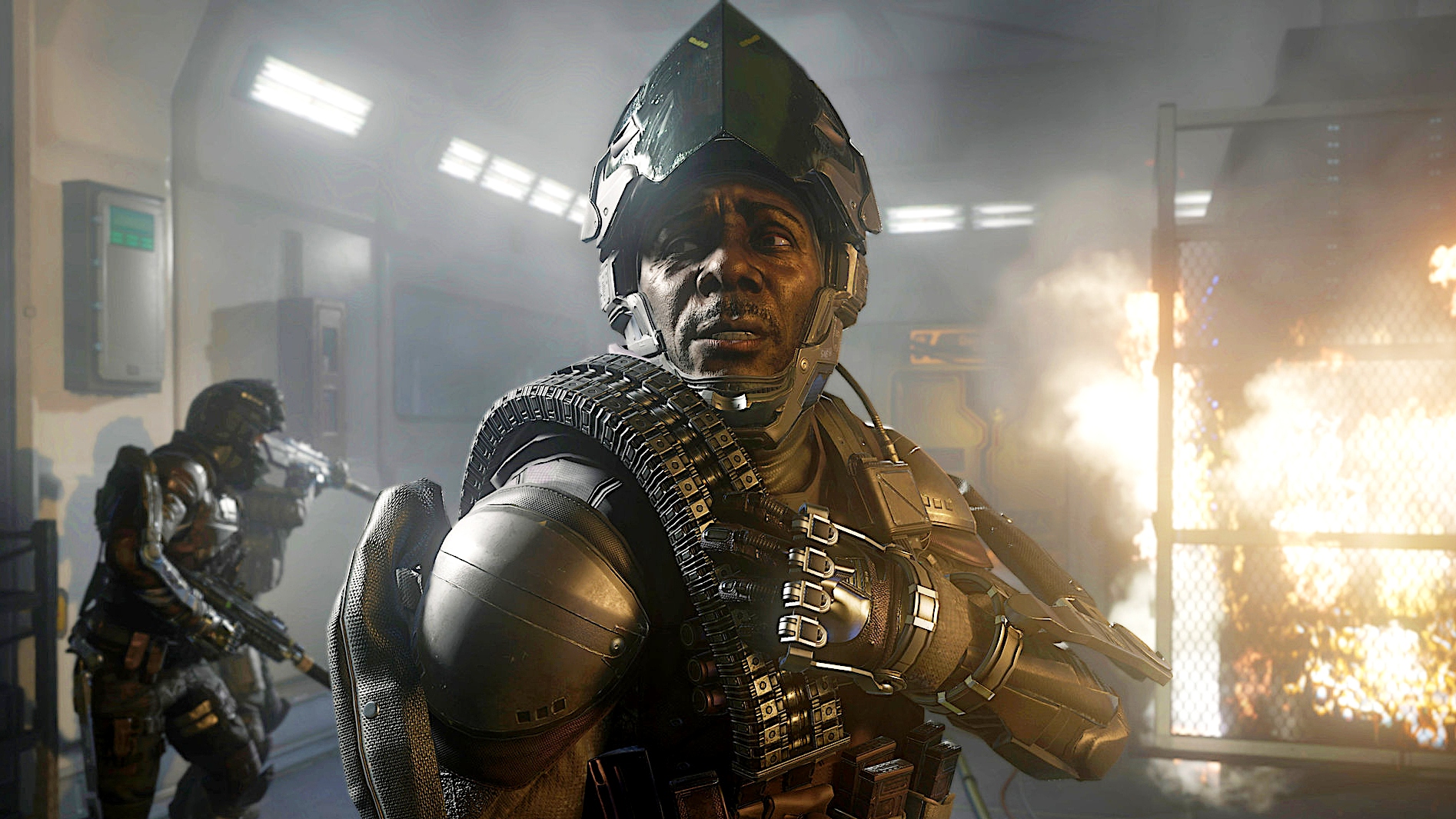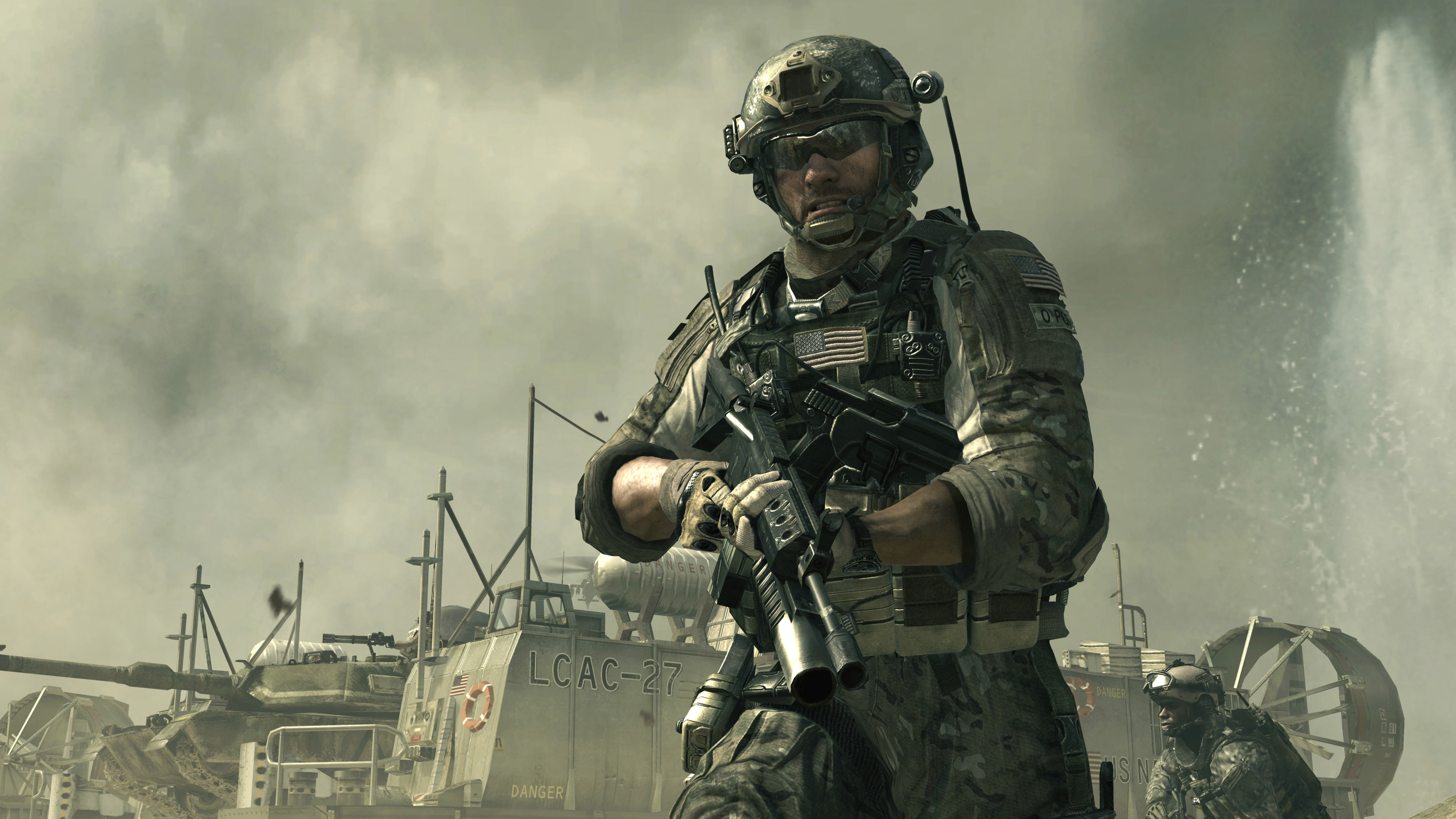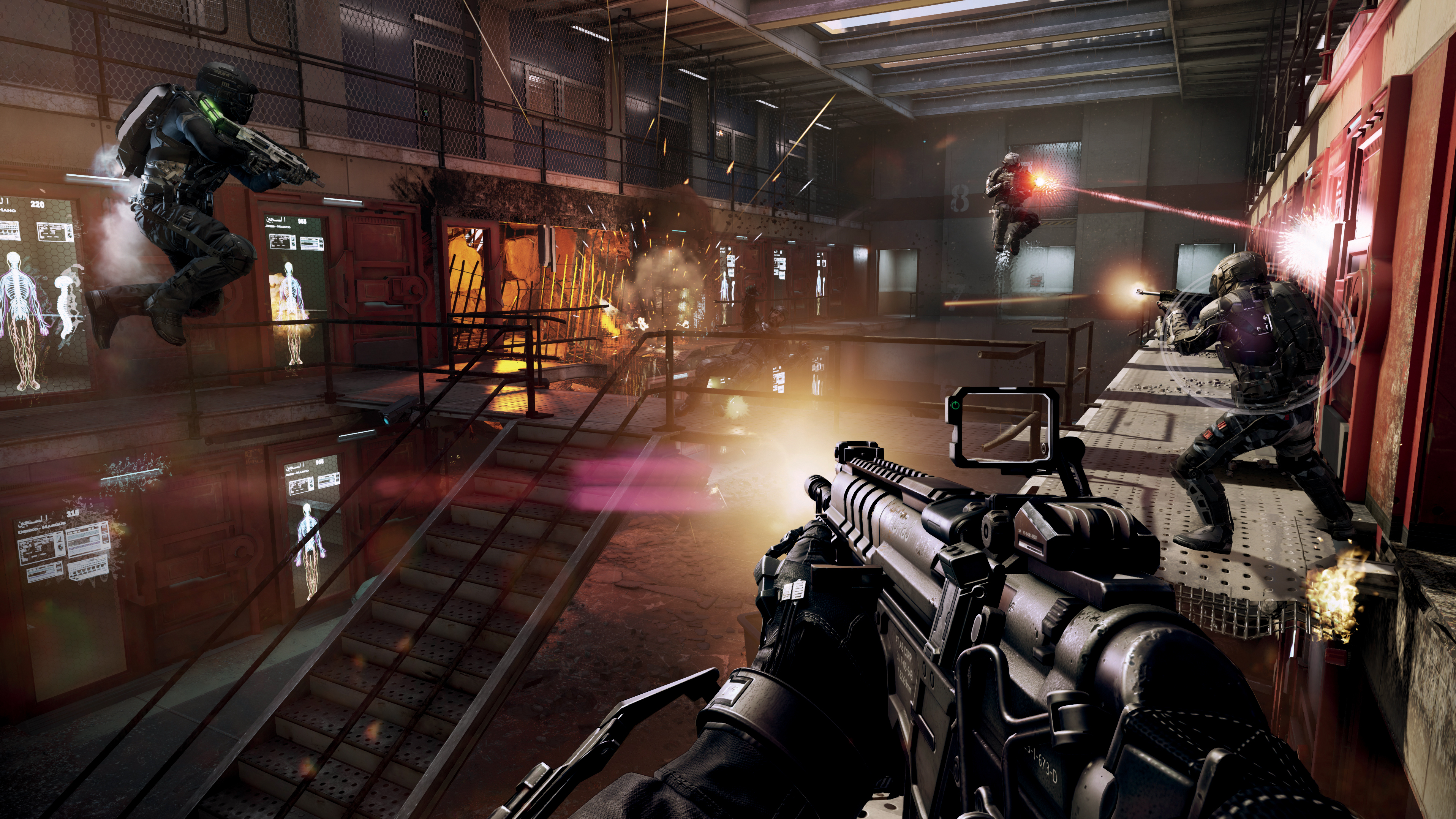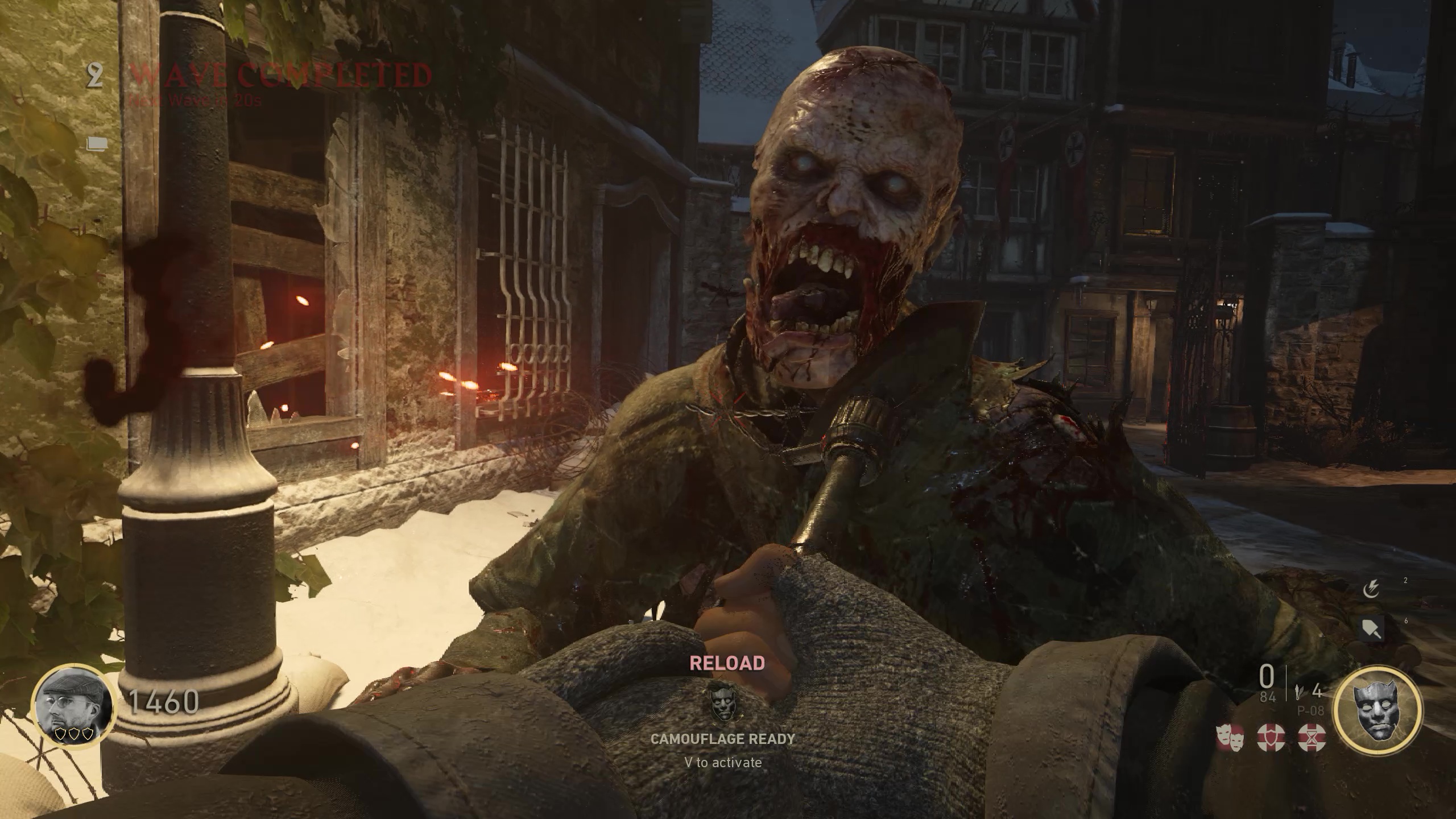How Sledgehammer stepped in to save Call of Duty
Advancing warfare.

This article first appeared in PC Gamer magazine issue 364 in December 2021, as part of our 'DNA Tracing' series, where every month we delve into the lineages behind iconic games and studios.
As you swim through the submerged Brooklyn Battery Tunnel with Delta Force, the headlamps of your submersible light up the side of a rusted gas tanker. Two faces stare back, from the logo of Schofield and Condrey Construction Ltd, a fictional company that has quite literally gone under. But there’s no time to linger: a Russian submarine is waiting to be commandeered in New York Harbor, and Modern Warfare 3 will instafail you for falling behind.
Most wouldn’t know that the two faces belong to Glen Schofield and Michael Condrey, the cofounders of Sledgehammer Games. This fleeting fanfare was all the studio would get as it made its debut at the heart of the biggest entertainment property in the world – and exerted huge influence over the concluding part of Modern Warfare’s water cooler campaign trilogy.
It wasn’t the game Sledgehammer was supposed to make. Composed primarily from Dead Space veterans, the studio was set up within Activision to work on a third-person COD spin-off dubbed Fog of War. Set during America’s notorious entanglement with Vietnam, it’s easy to imagine how it might have applied the developer’s experience with claustrophobic horror to the tight tunnels of Cambodia. But just months into development, crisis hit Activision. Infinity Ward’s Jason West and Vince Zampella left the company in deeply acrimonious circumstances to make Titanfall – and a huge chunk of the Modern Warfare 2 team marched out with them.
Modern Worry

Infinity Ward was left with a gaping hole on its flank, and Sledgehammer filled the breach. As two acclaimed leaders and storytellers departed, two more walked in. Schofi eld and Condrey picked up the baton with the aim of tightening up a “sketchy” story. Modern Warfare 2’s campaign had been stuffed with brilliant Bond moments – the snowmobile jump, the favela rooftop chase – but in the pursuit of ever-bigger explosions, Infinity Ward appeared to have concussed its screenwriters. The Modern Warfare 3 team responded by paring back the number of playable characters and tying up loose ends with the elusive Russian ultranationalist, Makarov.
What they didn’t do was pare back the bombast. Modern Warfare 3 treats Europe’s oldest cities as a big toy set, toppling the Eiffel Tower and fi lling out the London Underground exclusively with terrorists in order to get away with a Tube crash that makes Skyfall’s equivalent look tame. At times this leads to tonal ugliness – it’s hard to grin through a blockbuster that treats a sentence like “All civilians at the Louvre are dead” as background radio chatter. But the best setpieces stick the landing, because they’re paired with moments of intimacy. You can’t help but laugh in delight as a US serviceman pushes his body right up against the wall of a cargo plane, dodging the dinghy you’re riding into the hold as enemy ships explode all around.
Ultimately, Sledgehammer can’t be blamed for Modern Warfare 3’s inherited failings. Infinity Ward had already escalated its ‘behind the headlines’ premise to world war, and not even Captain Price could strongarm the genie back into the bottle. Yet Sledgehammer had achieved a miracle – stepping so nimbly into the shoes of the most acclaimed developer in the FPS genre that nobody even noticed the switch. Players wouldn’t truly feel West and Zampella’s absence until Call of Duty: Ghosts.
Career Advancement

While that disaster happened, Sledgehammer took the opportunity it had earned and then some: the chance to take ownership of a new Call of Duty sub-series. Naming it Advanced Warfare was a statement of intent. This would be the first COD in many years to have a clear purpose, highlighting America’s increasing dependency on private military companies. What if, it asked, creative differences led a US-funded yet stateless army to launch a coup?
Keep up to date with the most important stories and the best deals, as picked by the PC Gamer team.
It’s unfortunate that Sledgehammer chose Kevin Spacey to embody the PMC threat – what was once a prestige piece of casting is now a black mark against the game. But Advanced Warfare’s many performance captured scenes anchor its alluring premise, letting Schofield and Condrey deliver on their dream of a story-first COD – one in which moments of spectacle are accentuated by the downtime in-between. Moreover, these are places you want to spend downtime in. One mission, set among the duck egg blue domes of Santorini, is a striking reminder of the blockbuster’s capacity to take you away to the world’s most beautiful locations, even if just to hunt terrorists.
Advanced Warfare’s downfall lay in design. Even for Call of Duty, a series so linear it’s best treated as interactive theatre, this entry was notably restrictive – its failstates quick and frustrating should you dare to poke your rifle off your allotted path. Worse, the QTE that ended Modern Warfare 3 turned out to be dark portent, predicting sequences that resemble the command-following game Bop It!. Only in the campaign’s closing missions does Advanced Warfare’s exosuit begin to feel like a tool for freedom and expression.
World War 2.0

Those faults were largely corrected in Sledgehammer’s Call of Duty: WWII. In some senses it was a step back – conceptually less bold than Advanced Warfare, leaning into the familiar imagery of D-Day and French countryside firefights. But this was less a soft reboot of the original COD than the very first Medal of Honor – embracing espionage with a centrepiece infiltration that requires you to memorise your papers.
The fighting, too, recalls the classic PlayStation shooter – granting enemies a catalogue of staggering animations that makes encounters feel desperate and scrappy. Best of all, Sledgehammer folds everything back into the squad – scrapping health regeneration and pushing you to look to your AI teammates for health kits and ammo. That mechanical investment leads, soon enough, to emotional investment.
Since then, Schofield and Condrey have both left Sledgehammer – the former now working on a spiritual successor to Dead Space, and the latter setting up a new studio for 2K. Dozens of developers have followed them out the door, and for those who remember Infinity Ward’s exodus, it feels as if history could be repeating itself.
Then again: Sledgehammer’s new Call of Duty, Vanguard, is a post-WWII story about the hunt for Hitler’s fictional successor. The message seems clear: when history comes around again, it doesn’t have to happen exactly the same way.
Jeremy Peel is an award-nominated freelance journalist who has been writing and editing for PC Gamer over the past several years. His greatest success during that period was a pandemic article called "Every type of Fall Guy, classified", which kept the lights on at PCG for at least a week. He’s rested on his laurels ever since, indulging his love for ultra-deep, story-driven simulations by submitting monthly interviews with the designers behind Fallout, Dishonored and Deus Ex. He's also written columns on the likes of Jalopy, the ramshackle car game. You can find him on Patreon as The Peel Perspective.

